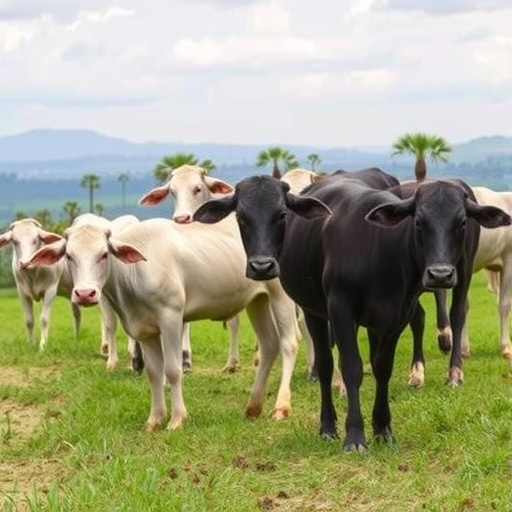In a recent study focusing on the management practices and challenges faced by smallholder farmers engaged in indigenous cattle production, researchers Abazinab, Duguma, and Muleta bring much-needed attention to the plight of livestock farmers in the Gera district of southwest Ethiopia. This extensive investigation sheds light not only on the traditional practices that have sustained these communities but also on the myriad constraints that hinder production efficiency and economic viability. The findings, soon to be published in the journal Discover Agriculture, promise to serve as crucial insights for policymakers, agricultural innovators, and the global community concerned with sustainable farming practices.
Cattle farming in Ethiopia holds traditional significance, intricately woven into the cultural fabric of many communities. The indigenous cattle breeds, robust and well-adapted to local conditions, are a backbone for many smallholder farmers, providing not just milk and meat, but also serving as a store of wealth and a means of transportation. The research meticulously outlines how these breeds have been nurtured through generations, showcasing the farmers’ deep knowledge of animal husbandry practices that have been developed over centuries.
One prevalent challenge identified in the study is the limited access to modern veterinary services and medications. Many farmers still rely heavily on traditional methods of disease control and treatment, which can be less effective compared to modern medical practices. This reliance not only affects animal health but can also lead to reduced productivity, as untreated diseases may spread through herds, stifling potential growth in both milk and meat production.
Moreover, the research highlights environmental factors impacting cattle farming in the Gera district. Climate change poses a threat to the traditional grazing lands, as shifting weather patterns unpredictably alter grass availability and quality. The study underscores the necessity for adaptive strategies that can mitigate these environmental challenges while ensuring that livestock remain a viable source of livelihood for local farmers. Enhanced understanding of the climatic impacts may guide future interventions aimed at improving resilience in cattle production systems.
The socioeconomic aspects of cattle farming are also brought into sharp focus in this analysis. Access to markets remains a significant hurdle for many smallholder farmers. The researchers found that poorly developed infrastructure and limited transport options often inhibit farmers from selling their produce at competitive prices. These conditions not only affect their income but also limit the availability of fresh, locally-sourced meat and dairy products within the community, thus creating a cycle of poverty that can be hard to break.
As the investigation delves into farming practices, it captures the diversity of methods employed by farmers in managing their livestock. From rotational grazing to integrated pest management, these practices showcase the ingenuity of local farmers in adapting to challenges. However, the research identifies a gap in knowledge transfer, where farmers are unaware of the more efficient practices that could further enhance productivity and sustainability. The need for extension services that effectively communicate research findings and innovations to these rural communities has never been more crucial.
Attention is drawn to the economic constraints faced by these farmers, with many struggling to invest in improved technologies or feed options. The study identifies the importance of financial services, such as microloans, which could enable farmers to purchase better equipment or veterinary care. Such financial support would help local farmers increase the productivity of their cattle, allowing them not just to sustain their livelihoods but potentially thrive.
The implications of this research stretch far beyond local communities. In a world increasingly concerned with food security, understanding the dynamics of smallholder farming is vital. Ethiopia, as a major livestock producer in Africa, has the potential to significantly impact regional food supply chains. The study’s insights contribute to this conversation, offering pathways for enhancing productivity and sustainability within the sector.
The collaborative nature of this research demonstrates the power of teamwork in tackling complex agricultural challenges. By combining expertise in animal science, agricultural economics, and rural development, the authors have produced a holistic view that captures the multifaceted nature of cattle production. This interdisciplinary approach is necessary to formulate effective strategies that can be scaled up or adapted in other similar regions facing comparable challenges.
In conclusion, the research conducted by Abazinab, Duguma, and Muleta provides a comprehensive examination of the current state of indigenous cattle production in Gera district, emphasizing the need for tailored interventions that address local challenges. As governments and organizations look to support food systems and bolster agricultural productivity, the findings of this study will prove to be invaluable. The integration of indigenous knowledge with modern agricultural practices may well hold the key to unlocking the full potential of smallholder farmers in Ethiopia.
The future of agriculture lies in balancing tradition with innovation, as demonstrated by these dedicated farmers in Southwest Ethiopia. Through their experiences, we learn vital lessons on sustainability, adaptability, and the enduring bond between communities and the land they cultivate. The research serves as a clarion call for a more concerted effort to support these farmers, ensuring their practices can thrive in the modern world while preserving the invaluable cultural heritage they represent.
Subject of Research: Constraints and management practices in indigenous cattle production among smallholder farmers.
Article Title: Management practices and constraints of indigenous cattle production among smallholder farmers in Gera district, southwest Ethiopia.
Article References: Abazinab, H., Duguma, B. & Muleta, E. Management practices and constraints of indigenous cattle production among smallholder farmers in Gera district, southwest Ethiopia. Discov Agric 3, 195 (2025). https://doi.org/10.1007/s44279-025-00241-4
Image Credits: AI Generated
DOI:
Keywords: Indigenous cattle, smallholder farmers, Ethiopia, livestock management, agricultural economics, climate change, food security, sustainable agriculture.




